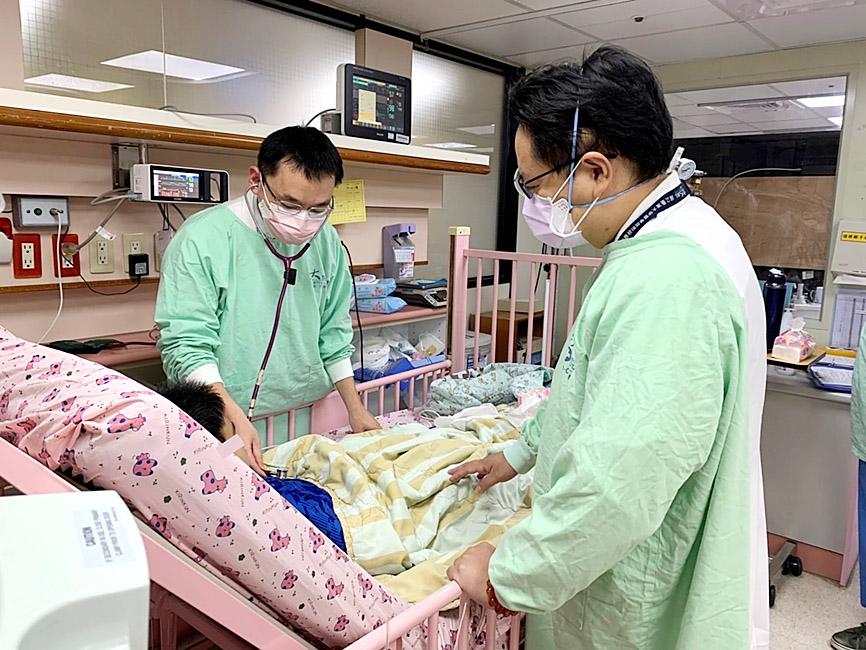Thirty-seven percent of children and adolescents hospitalized with COVID-19 had neurological symptoms, a study conducted by National Taiwan University Hospital (NTUH) found.
Two of them had a stroke after developing encephalitis, the hospital told a news conference on Friday morning to promote COVID-19 vaccinations for children.
NTUH Department of Pediatrics director Lee Wang-tso (李旺祚) said the hospital worked with more than a dozen other hospitals to established a reporting system for people aged 18 or younger who were diagnosed with COVID-19.

Photo courtesy of the National Taiwan University Hospital via CNA
Among the 1,163 cases in its database, 404 were hospitalized, 148 of whom, or 37 percent, exhibited neurological symptoms, including 13 cases, or 9 percent, with suspected or confirmed encephalitis, he said.
Of the 13 juvenile cases, two had a stroke, Lee said, adding that they recovered after treatment.
One of them is a 12-year-old boy who developed weakness in the right leg and a fever after he was diagnosed with COVID-19, Lee said, adding that pathological changes were found in his blood vessels, the left side of his brain and his right frontal lobe.
The boy’s limb weakness improved after treatment, he said.
The other case is an eight-year-old boy, who developed a fever, convulsions and abnormal liver function after being diagnosed with COVID-19, he said.
The child developed inflamation and local ischemia, and pathological changes were found in his blood vessels, Lee said.
The boy recovered after receiving intravenous immunoglobulin and remdesivir, and was discharged from hospital, he added.
Lee said the data showed that the risk children infected with the Omicron variant of SARS-CoV-2 develop encephalitis or encephalitis-like symptoms is nearly 10 times higher than for children infected with the initial variants of the virus.
Although children who have the disease rarely have a stroke, pathological changes in their blood vessels pose an increased risk that should not be neglected.
Nearly half of the cases examined using magnetic resonance spectroscopy showed cerebral vascular changes, Lee said.
Children are also at risk of developing multisystem inflammatory syndrome in children (MIS-C) after recovering from acute COVID-19, he said, adding that this risk should not be neglected either.
Department deputy director Chang Luan-yin (張鑾英) said that most of the cases in the database were unvaccinated.
However, as the vaccination rate among children aged five to 11 has increased, fewer cases have been reported, Chang added.
National Taiwan University Children’s Hospital superintendent Huang Li-min (黃立民) said that vaccination is the most important way to prevent severe COVID-19 complications and MIS-C, so the hospital encourages parents to bring their children to get vaccinated as early as possible.
Additional reporting by CNA

AIR SUPPORT: The Ministry of National Defense thanked the US for the delivery, adding that it was an indicator of the White House’s commitment to the Taiwan Relations Act Deputy Minister of National Defense Po Horng-huei (柏鴻輝) and Representative to the US Alexander Yui on Friday attended a delivery ceremony for the first of Taiwan’s long-awaited 66 F-16C/D Block 70 jets at a Lockheed Martin Corp factory in Greenville, South Carolina. “We are so proud to be the global home of the F-16 and to support Taiwan’s air defense capabilities,” US Representative William Timmons wrote on X, alongside a photograph of Taiwanese and US officials at the event. The F-16C/D Block 70 jets Taiwan ordered have the same capabilities as aircraft that had been upgraded to F-16Vs. The batch of Lockheed Martin

GRIDLOCK: The National Fire Agency’s Special Search and Rescue team is on standby to travel to the countries to help out with the rescue effort A powerful earthquake rocked Myanmar and neighboring Thailand yesterday, killing at least three people in Bangkok and burying dozens when a high-rise building under construction collapsed. Footage shared on social media from Myanmar’s second-largest city showed widespread destruction, raising fears that many were trapped under the rubble or killed. The magnitude 7.7 earthquake, with an epicenter near Mandalay in Myanmar, struck at midday and was followed by a strong magnitude 6.4 aftershock. The extent of death, injury and destruction — especially in Myanmar, which is embroiled in a civil war and where information is tightly controlled at the best of times —

China's military today said it began joint army, navy and rocket force exercises around Taiwan to "serve as a stern warning and powerful deterrent against Taiwanese independence," calling President William Lai (賴清德) a "parasite." The exercises come after Lai called Beijing a "foreign hostile force" last month. More than 10 Chinese military ships approached close to Taiwan's 24 nautical mile (44.4km) contiguous zone this morning and Taiwan sent its own warships to respond, two senior Taiwanese officials said. Taiwan has not yet detected any live fire by the Chinese military so far, one of the officials said. The drills took place after US Secretary

THUGGISH BEHAVIOR: Encouraging people to report independence supporters is another intimidation tactic that threatens cross-strait peace, the state department said China setting up an online system for reporting “Taiwanese independence” advocates is an “irresponsible and reprehensible” act, a US government spokesperson said on Friday. “China’s call for private individuals to report on alleged ‘persecution or suppression’ by supposed ‘Taiwan independence henchmen and accomplices’ is irresponsible and reprehensible,” an unnamed US Department of State spokesperson told the Central News Agency in an e-mail. The move is part of Beijing’s “intimidation campaign” against Taiwan and its supporters, and is “threatening free speech around the world, destabilizing the Indo-Pacific region, and deliberately eroding the cross-strait status quo,” the spokesperson said. The Chinese Communist Party’s “threats